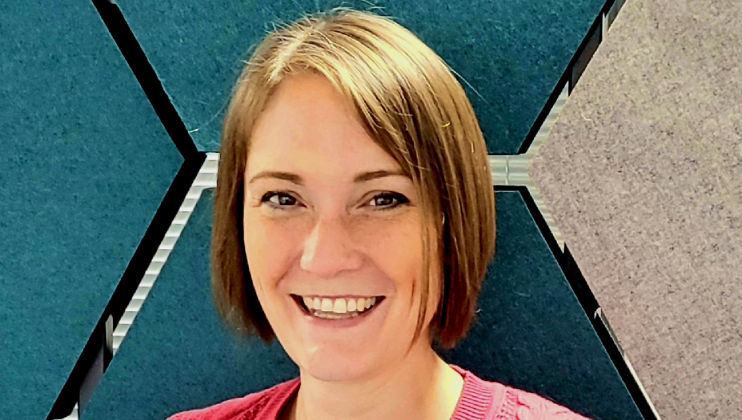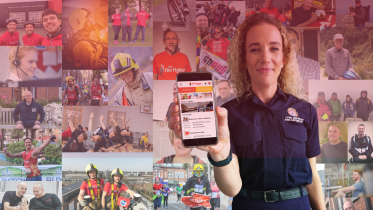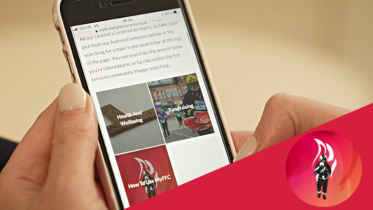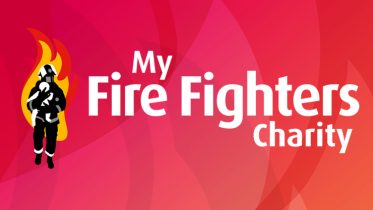Every decision we make and every change we introduce to our support is rooted in an evidence-base, to ensure we’re delivering the right help to you in the right way, and at the right time.
And central to that whole process is Professor Rowena Hill, our Honorary Research Lead at Nottingham Trent University since 2013.
Working alongside our Senior Leadership Team, Rowena has, through published research, helped to develop our support pathways in line with the health and wellbeing needs of all fire service personnel and their dependants across the UK.
Our Chief Executive, Dr Jill Tolfrey, says: “Our research and development programme is central to ensuring we have the right services and support in place for our beneficiaries, whatever their stage of life.
“Working with Professor Hill and her team to really understand the needs of the fire services community means that every decision we make to invest money donated and raised by our supporters, is backed up by rigorous research. We are not making assumptions or using guess work, we are delivering the support that qualified, independent academic research tells us is needed.
“I hope this reassures every person who donates to us or fundraises for us, that we are investing every pound you give to us in the best possible way, to deliver the best health and wellbeing results for our fire family.”

Rowena’s key research area is individual and family wellbeing within the emergency services. This includes the psychological impacts of emergencies and disasters – including everything from the Covid-19 pandemic to climate change – on emergency responders and their families as well as the public.
She works particularly closely with the UK fire services community, which has always held a special place in her heart.
“My dad was a firefighter, so that’s where my interest started,” Rowena tells us. “I grew up in the service and, when I came to think through what I wanted to do with my career, I knew that I wanted to help the most at risk populations on their worst day.
“Rather than working in the emergency services directly, I determined the way to do that, and to add my value, was to work with the emergency services by supporting the sector with evidence-based research and informed decision-making, particularly around keeping firefighters and their dependants healthy and happy.
“My PhD focus was around the occupational impacts on families of working in the fire service. I’m interested in the whole support system around firefighters and their lives, as well as what firefighters can do for themselves.
“We know from literature, for instance, that if they have a really healthy co-worker support system and home life support system, then they’re much more able to recover if anything disrupts their resilience or happens to them.”
Rowena has worked closely with different fire and rescue services for 20 years, both regionally and nationally, as well as becoming the inaugural Chair of the National Fire Chiefs Council Academic Collaboration, Evaluation and Research group, which is a multidisciplinary group designed to facilitate research/evidence informed practice across the fire sector.
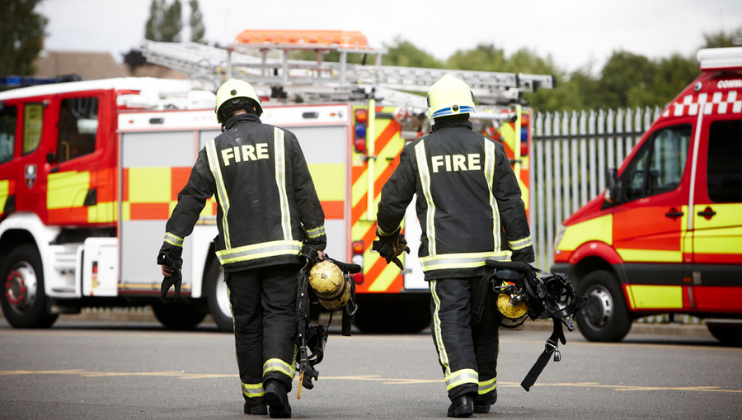
She was also the embedded scientist for the C19 National Foresight Group, a cross-government and multi-agency group set up to support the UK response to Covid-19.
“I work through this Charity, the National Fire Chiefs Council (NFCC), representative bodies such as the Fire Brigade Union – as well as with the Home Office and Government.
“If you look at a stakeholder map, I’m hopefully working with most of those. And that is on purpose to place independent evidence based decision making across the sector. The charity is drawing all of those aspects together to keep all fire and rescue personnel healthy and happy… that takes quite a lot of doing and some real strategic thinking, which the charity is very good at.”
Day-to-day, Rowena describes herself as a “critical friend” to us.
“I have regular meetings with the Senior Leadership Team, which are systematic and process-driven,” says Rowena.
“But my role is fluid. It is also about showing up when you need me, and sometimes being a critical friend. The charity has really challenged me about where my research programmes are going and why, and how my teams can develop their work to have relevant research delivered at the right time, and it’s vice-versa.”
This strong relationship has aided us in adapting our support, often at short notice, to meet changing health and wellbeing needs within our fire family.
“With the pandemic, for example, I met with the Senior Leadership Team early in those first few months and we talked through what we saw the developing consequences to be from the literature. It helped that I had a place in the national response at the time, and we talked through potential options of what the future might look like,” adds Rowena.
“The SLT team was then able to think, ‘okay well how would that change the beneficiary need, and what do we then need to plan to mature at the right time… for us to have support in place when that need emerges?’”
Those meetings, and the advice from Rowena, led to us rolling out our Covid Recovery Programme, aimed at supporting those with ongoing symptoms of Covid-19. She says that the SLT leadership style and responsive nature of the charity is “impressive” and something that she respects.
A focus for Rowena now is mapping current and future health and wellbeing needs of fire service personnel following the pandemic.
“One way we’re doing that as the moment is with our national wellbeing survey, to try to get a sense of the needs out there,” she says.
“We’re keen to understand the changing nature of beneficiaries’ needs, because we don’t just sit in a vacuum – the pandemic has happened, cost of living has happened, and all those different things will play out in different ways across the different sections of the country.
“We have just completed the survey for this year to capture the experiences of all those currently employed in the fire community across the UK, and later on this year we will have another research project for those beneficiaries who are transitioning into retirement, or who are retired.
”This work follows a big national research project we completed a couple of years ago with the charity, as we know retirement can be a challenging time. This second phase of the retirement work is about evaluating the evidence-based changes we implemented from the first phase of the research programme. It’s a long-term relationship the charity has with academia and I play a small part in facilitating that.”
You can read more about the survey, and take part, here.
Research flags climate risk to firefighters’ health
Rowena recently wrote a first-person piece for The Conversation titled: UK heatwave: how the fire service will need to prepare as extreme weather events get worse.
In it, she discusses the huge impact extreme weather will have on firefighters’ wellbeing, as well as that of their families, in the years ahead.
“The nature of our wellbeing provision will have to change,” she tells us. “When we look at what people are mostly dealing with at the moment, it’s not necessarily as much trauma – largely because the fire service has been so good with its prevention work, it’s actually done very well in preventing risks of fires and rescues.
“However, when risks of those events start to rise again because of the impacts of climate change, we’re going to see a different wellbeing profile.”
Rowena also expressed concerns for the families and dependants of firefighters, as weather events grow more extreme in the future and inevitably lead to more call outs.
“Healthy family relationships are one of the biggest protective factors for firefighters, so much so I sometimes refer to them as the unpaid additional occupational health unit of the fire and rescue service,” she adds. “As we see firefighters responding more in their own communities going forwards (in regards to the weather), it might change their own wellbeing needs and more support might be needed.
“This is all theoretical, we don’t know until we get there, but learning from previous evidence, we’re looking at quite a different profile of what our beneficiaries might need.”

